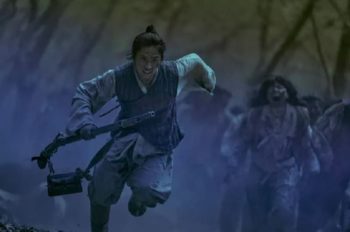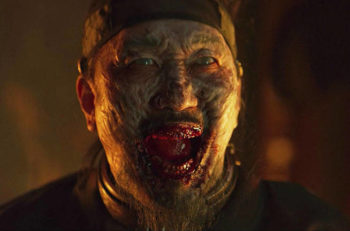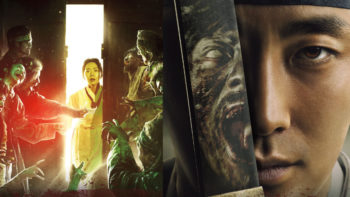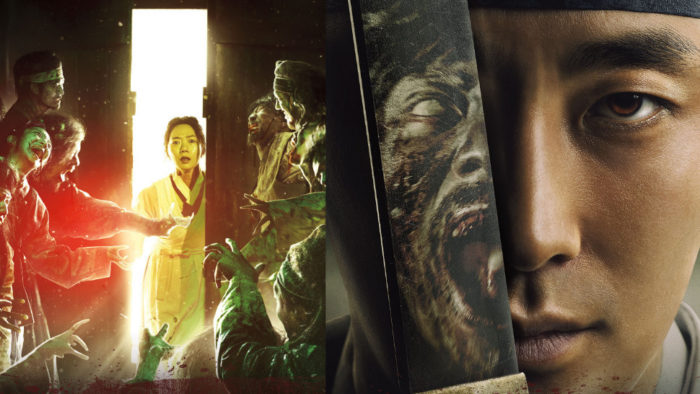The Kingdom: A Fresh Look at Zombies
South Korean filmmakers have featured zombies on multiple occasions, as the linked page shows. Yet their newest edition of a zombie story on Netflix, The Kingdom, has some aspects you won’t see in a zombie feature produced in the United States. First, it’s got an aspect of political intrigue that leaks over into moral commentary that I’ll talk about in a bit. Second, it’s a period piece, set roughly in the year 1600 in Korea. And third, its take on zombies is different from anything I’ve seen before.
I’ve only seen the first four episodes of the first season as of the moment of writing this post, so I can’t possibly give away how season one ends, nor can I say anything at all about season two, which Netflix recently released. However, if you don’t want to know anything at all about this series before watching it, skip this post, because I will talk about some general aspects and background of the story.
Different Zombies
The origin of the idea of a zombie comes to the world from Haiti, where legend was that supernatural power could reanimate a body and give it generalized invulnerability to harm–other than an attack to its head. Zombies in their first iterations and infamously as featured on The Walking Dead, are slow, lumbering, and stupid beasts, whose main means of killing someone stems from their ability to silently lurk almost anywhere and from the fact that once they start coming after you, they never need to stop to rest, nor do they even seem to need to eat, even though they’re continually biting any human being they can.
A major part of the fear behind this “classic” version of a zombie is the fear of becoming one. I’d say that fear links to the fear of death itself, because just as dead bodies rot in the grave, zombies a-la The Walking Dead rot as they shuffle around, decay as they move forward, having the appearance of people you once knew and loved, but have lost all the inner qualities that once defined them. Which is very much along the lines of how people who do not believe in life after death feel about dead bodies–they are nothing more than rotting meat, reminding us that death is eventually coming for us all.
South Korean zombies tap into a different fear. The fear of being attacked by a viscous predator. South Korean zombies are a lot more dangerous than those of The Walking Dead or other “classic” portrayals of zombies.
Korean films like Train to Busan and the series The Kingdom aren’t entirely unique in this regard. World War Z seems to have answered the question, “How could zombies really take over the world if they’re so slow and stupid?” by making them sprint at incredible speeds and having a single bite from a zombie rapidly convert a regular person into a zombie as well. Zombies even scale walls in WWZ and as a result collectively act with at least rudimentary problem-solving skills.
Zombies in The Kingdom also sprint. Though no faster than a regular person can run, unlike WWZ. And the conversion process changes in the episodes I’ve seen. At first, it required some time, a number of hours, like The Walking Dead. But soon the situation changes and people after a single bite become a zombie within seconds, like World War Z.
As a traditional Korean doctor featured in the story observes, “the sickness has changed.” Which is how becoming a zombie is portrayed in The Kingdom, as an illness, like most modern zombie films show it.
However, the first case of the illness seems to have been caused by an herb Korean physicians in the story believed would raise a person from the dead. It did, but not in the way they intended–which shows an aspect of “science gone wrong” in this story. Though set in Korea circa 1600.
Note that as a sickness, the behavior of zombies makes somewhat more sense than either World War Z or The Walking Dead, while striking a note out of vampire tales. Zombies in The Kingdom only come out at night. As the sun rises, they seek dark places to hide themselves, becoming as comatose as a dead body. Until night comes again. As if they really are metabolically alive and need to rest–just as they need to eat.
These zombies often eat people alive, even as the person being eaten is rapidly becoming a zombie. The Kingdom shows zombies as ravenously hungry, not just for brains as in Romero’s The Night of the Living Dead or Z Nation, but to eat an entire person whole, yes, like The Walking Dead at times, but eating much more quickly. As if these zombies are like ravenous lions, tigers, or bears (oh my 🙂 ). Instead of decaying human beings.
Set in 1600 Korea
The exact year hasn’t been given in the story, but it occurs only a few years after a Japanese invasion of Korea that was finally repulsed in 1598, which is referenced multiple times. In fact, at first, the story seems to be only a period piece set in Korea circa 1600. The first episode shows traditional doctors performing their ordinary work, Confucian scholars worried about who will run the kingdom in the aftermath of the Japanese invasion, the nobles also reacting to that situation, and the Crown Prince Lee Chang going about the business of being the equivalent of a Vice President, someone who will take over the government but only if the current leader dies. It’s a bit of a slow burn in the first episode, the first zombies not appearing until near the end.
The portrayal of Korea’s past at first seems meticulously correct in all details and the costumes in particular are striking. But then the zombie plague happens, which throws away the strict attention to history that begins The Kingdom.
The setting is cool in that most people in the story don’t have weapons at all, and even those who do are often limited to swords and bows and arrows–though a handful of muskets are in the story as well. Would you want to fight a horde of super-aggressive zombies with nothing better than a sword or a musket? Me, neither.

The peasant veteran of the war with Japan running from the zombie horde. Image copyright: Netflix.
Note though that this tale is not the only Korean zombie apocalypse set in the historic past! The 2018 movie Rampant (which I have not seen) apparently comes from around the same time period.
Political Intrigue
The Crown Prince Lee Chang (played by Ju Ji-hoon) seems to be involved in an ordinary plot to assume his place as king after word of the death of his father leaks out. Because if a new heir is born to the current queen, his life will be worth nothing (because his mother was not a queen). But then the story reveals that the claims to his father still being alive are based on him having become a zombie…

The king may “live” forever!
Image copyright: Netflix.
The struggle between the First Minister Cho Hak-ju (portrayed by Ryu Seung-ryong), who is behind the plot to keep the king “alive,” and the Crown Prince form the basis of the story’s political intrigue. Though in general, the nobles support Cho Hak-ju, while Lee Chang’s supporters are mostly peasants.
Bad Nobles, Good Prince
The upper crust of Korean society are shown as nonchalantly caring only about themselves, condemning ordinary people to death through both inaction and selfish acts. With the exception of Lee Chang, who at first seems rather selfish, but quickly transforms into a self-sacrificing leader, who is doing everything he can to save his people, all his people, from the zombie apocalypse.
This underpins the moral framework of the story. While others long to have power for their own benefit and enjoyment, the Crown Prince becomes a deeply caring and self-sacrificing war leader as the zombies attack. While a group of nobles flee in a half-empty ship, leaving the peasants to their doom, Lee Chang herds them into a walled compound and does everything he can to protect them. Even giving up his personal food rations, so ordinary people could have something to eat.
In fact, food, that the peasants hardly have any while nobles eat at their leisure, while everyone is being chased by ravenous zombies, makes hunger and the menace it poses a much more important part of this story that what you usually see in zombie tales.
Note the prince’s personal bodyguard, a female doctor played by Bae Doo-na (who I know from Cloud Atlas), and an enigmatic peasant who fought against the Japanese round out the group of “good guys” who seek to cure the zombie sickness, keep the people alive, and avoid the troops sent by Cho Hak-ju to kill Lee Chang.

The Prince and the woman doctor are the main figures on this poster. Image copyright: Netflix.
Name Trivia
By the way, the name of this series in Korean is 킹덤, which is approximately pronounced as…”Kingdom”!
So the English word “kingdom” is the basis for the series name, though written in Korean writing (Hangul) in the South Korean version. A bit of trivia I found interesting.
Conclusion
I may have more to say about this story later on, but for now, while it does share with other zombie tales some normalizing gore and can be genuinely frightening at moments, this story so far for the most part qualifies as clean fiction in spite of its MA rating (so far, no nudity and no profanity, though the violence is at times graphic and disturbing). Another potential negative point is it also in general shows people as oddly irreligious, at least so far, even when facing predatory zombies. Which I would say is not a strictly realistic portrayal of human nature–most human beings, including in pre-Christian Korea, have prayed or otherwise sought supernatural help in the real world, especially in times of severe crisis.
But the portrayal of a self-sacrificing and compassionate leader dedicated to the lives of all his people, not just those of his social class, forms a strong moral positive to this tale. That portrayal, along with the sheer fun of zombies so different from what you may be used to and the things people must do to survive, makes this series worth recommending.
How about you, readers–have you seen any South Korean zombie films? In particular, have any of you seen both Rampant and also The Kingdom? I’d be interested in your perspective of what make them different from one another. Or how zombie films are different in Korea in general, including what you do or do not like about them. Other thoughts?
(By the way, if you want to hear the above content in podcast format, I created on for the first time you can find linked here:)
https://travissbigidea.podbean.com/











































I’ve been watching Korean dramas and entertainment forever. Kingdom is a wonderful deviation from the Joesan era in that it mixes political intrigue and dystopian very well. The acting is superb.
I’ve seen both seasons so there’s A LOT more that will be explained in the next season. What I love about the show is the fact that it shows that morality can and should exist even when everything around you is going crazy. Such as zombies. The fact that the prince is trying to do the right thing by the people is noteworthy.
Train to Busan was good. A wonderful rollercoaster ride.
The East, generally speaking, is really good at depicting self-sacrifice for the good of the community than individual pursuits. Also, in Kingdom, I think they went for a more scientific approach than a religious approach because that’s just the sign of the times. They show through one of the characters just how methodical they were even though they didn’t have the scientific breakthroughs of today.
I love the show!
Yeah I would agree their portrayal of especially the medical people is that they have a mindset very much like modern scientists. How accurate to history that is I can’t say–but I think I see why the storytellers chose to go that direction.
Rampant or The Kingdom may have been one of the dramas I read the description of when my family still had a Netflix account. I never saw it, but it sounds interesting.
I’ve seen some other Asian shows with zombieish creatures, though. Hakuoki being the easiest to recall. The first two seasons of it were just a silly romance, so I don’t recommend them except to people that like that particular genre. But the third season(prequel to the whole series) is actually pretty good. It’s called Hakuoki Reimeiroku, and it has kind of a slow build to the zombie like creatures. Basically, what happens is that the main char, a blue haired guy named Ibuki, is given food by a tyrannical person and is therefore kinda caught up in a life debt type situation. So he ends up hanging out with the Shinsengumi as they start chasing their dreams and gaining renown.
But there’s a lot of dark politics within the group. There’s Kondou and his men, who are an idealistic group of friends that want to protect Japan against the threat they perceive from foreigners. And then there’s Serizawa, who’s tyrannical and overall very problematic. Kondou’s men despise Serizawa, but need his help to get where they want in life, which is partly where the ‘zombie’ thing starts coming in.
The group is told to experiment with this thing(Water of Life I think it’s called) and the experiments are conducted in secret. The stuff is partly derived from Oni, if I recall from the other two seasons, but people are not Oni and the Water of Life is not perfect. It turns people into monsters that are sort of like a cross between zombies and vampires(they kind of act like fast, agile zombies, but they aren’t rotten and they drink blood).
The show is about the political and social interactions as Kondou’s men struggle with Serizawa’s antics. The zombie thing is one of the big parts of that. Along the way, one of the main themes in the show is resolve. On on hand, there’s Ibuki, who starts out with barely anything resembling positive resolve. Then you have Serizawa, who has so much resolve that he is too willing to do unnecessary bad things in order to intimidate people into letting him accomplish what he needs to. And then there’s Kondou’s men, who are on a spectrum in between. They are idealistic and want to do what’s right, but how firm is their resolve in the face of people like Serizawa? What are they willing to do to accomplish what they believe in? How do they respond to the challenges to their idealistic outlooks?
Again, that’s in the third season, Hakuoki Reimeiroku. I think it’s on Hulu, but who knows if it’s been added to Netflix or YouTube. It’s pretty clean, too. The worst aspects of it are probably just a couple crass things Serizawa says far later on, but that was more to show his problematic tyrannical nature than anything else. But yeah, it’s an interesting historical fantasy story. There’s a lot of subtle hints to character motivations and such as the story goes on, so it’s one of those shows where it’s worth paying close attention to everything the characters say and do and fitting it into the overall puzzle of cause and effect.
I think Tokyo Ghoul might kinda explore some zombie like creatures, but I’m not for sure since I haven’t seen it. It’s probably a pretty dark show, though.
Rot and Ruin, along with Rebirth (which are on Line Webtoon) are two other zombie stories I’ve been fond of lately. They aren’t Asian dramas, but they do have interesting takes on the zombie genre and are free to read. Rot and Ruin was apparently based off a book series, actually.
Also, Tapas has another one called Dreamcide, and it may actually be a Korean comic. I’m waaaaay behind on it, though. It’s a little less unique as far as zombie stories go, though there is a bit of a time travel aspect.
I also recommend watching the Subbed version of Hakuoki Reimeiroku(or pretty much any anime, actually) instead of the Dubbed. The voice acting for the English dubbed version of Reimeiroku doesn’t sound nearly as good as the original acting.
I’ve been watching the subtitled version of The Kingdom. I definitely prefer hearing the original actors!
Now that I think about it, Fate Zero kinda dealt with zombie like creatures within the two episodes dedicated to Kiritsugu’s backstory. They were called ghouls, dead apostles, etc. though. They didn’t necessarily eat people, either, they more so just bit people so they could spread. They were the result of mages experimenting with immortality and in some cases being greedy and weaponizing these zombie/ghoul/vampire like creatures.
Those two episodes are probably what I would recommend people watch to try the series out and see if they like it or can handle its dark tragicness. Even though they take place in the second season, they could almost be regarded as a standalone short story. The sad, tragic angle to those episodes might also be a different take on ‘zombies’ than most people are used to.